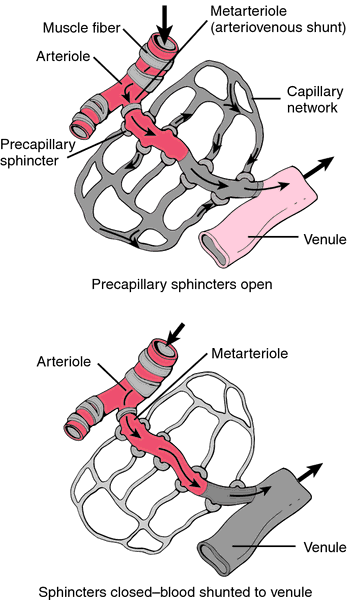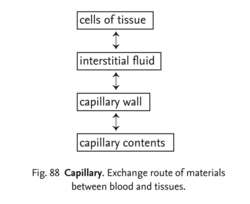capillary
[kap´ĭ-lar″e]1. pertaining to or resembling a hair.
2. in the circulatory system, one of the minute vessels connecting arterioles and venules, the walls of which act as a semipermeable membrane for interchange of various substances between the blood and tissue fluid. Capillary walls consist of thin endothelial cells through which body fluids and dissolved substances can pass. At the arterial end, the blood pressure within the capillary is higher than the pressure in the surrounding tissues, and the blood fluid and some dissolved substances pass outward through the capillary wall. At the venous end, the pressure within the tissues is higher and waste material and fluids from the tissues pass into the capillary, to be carried away for disposal.

Capillary. From Applegate, 2000.
arterial capillary a vessel lacking complete coats, intermediate between an arteriole and a capillary. Called also precapillary.
venous capillary a type of minute vessel that lacks a muscular coat and is intermediate between a venule and a capillary. Called also postcapillary.
Miller-Keane Encyclopedia and Dictionary of Medicine, Nursing, and Allied Health, Seventh Edition. © 2003 by Saunders, an imprint of Elsevier, Inc. All rights reserved.
cap·il·lar·y
(kap'i-lār-ē), [TA]1. Resembling a hair; fine; minute.
2. A capillary vessel; for example, blood capillary, lymph capillary. Synonym(s): vas capillare [TA], capillary vessel
3. Relating to a blood or lymphatic capillary vessel.
[L. capillaris, relating to hair]
Farlex Partner Medical Dictionary © Farlex 2012
capillary
(kăp′ə-lĕr′ē)adj.
1. Relating to or resembling a hair; fine and slender.
2. Having a very small internal diameter: a capillary tube.
3. Anatomy Of or relating to the capillaries.
4. Physics Of or relating to capillarity.
n. pl. capillar·ies
1. Anatomy One of the minute blood vessels that connect arterioles and venules. These blood vessels form an intricate network throughout the body for the interchange of various substances, such as oxygen and carbon dioxide, between blood and tissue cells.
2. A tube with a very small internal diameter.
The American Heritage® Medical Dictionary Copyright © 2007, 2004 by Houghton Mifflin Company. Published by Houghton Mifflin Company. All rights reserved.
capillary
Any of the microscopic blood vessels that connect minute arterioles and equally minute venules. Capillaries form a network throughout the body and are the functional unit of general circulation. Capillary walls are semipermeable and allow passage of O2, glucose and other nutrients from the blood into the cells, and waste products (CO2, NH3) into the blood to be excreted or eliminated through the lungs.Segen's Medical Dictionary. © 2012 Farlex, Inc. All rights reserved.
cap·il·lar·y
(kap'i-lar-ē) [TA]1. Resembling a hair; fine; minute.
2. A capillary vessel; e.g., blood capillary, lymph capillary.
3. Relating to a blood or lymphatic capillary vessel.
[L. capillaris, relating to hair]
Medical Dictionary for the Health Professions and Nursing © Farlex 2012
capillary
The smallest and most numerous of all the blood vessels. Capillaries form dense networks between the arteries and the veins, and it is only in the capillary beds that interchange of oxygen, carbon dioxide and nutrients can take place with the cells.Collins Dictionary of Medicine © Robert M. Youngson 2004, 2005
capillary
one of many minute blood vessels (5–20 μm diameter) which connect ARTERIOLES and VENULES in vertebrate tissues allowing a high level of exchange of materials to take place between blood and tissues via the interstitial fluid or LYMPH. See Fig. 87 . Capillary walls are made up of a single layer of epithelial cells which are flexible, allowing changes in diameter with changing blood pressure. See Fig. 88 . Capillaries are efficient because- they are thin-walled, with narrow diameters giving a high surface-area-to-volume ratio,
- they are very numerous, forming a CAPILLARY BED, and
- blood flow is slow, allowing maximum time for exchange.
Collins Dictionary of Biology, 3rd ed. © W. G. Hale, V. A. Saunders, J. P. Margham 2005
Capillary
The tiniest blood vessels with the smallest diameter. These vessels receive blood from the arterioles and deliver blood to the venules.
Mentioned in: Preeclampsia and Eclampsia
Gale Encyclopedia of Medicine. Copyright 2008 The Gale Group, Inc. All rights reserved.
cap·il·lar·y
(kap'i-lar-ē) [TA]1. Resembling a hair; fine; minute.
2. A capillary vessel; e.g., blood capillary, lymph capillary.
[L. capillaris, relating to hair]
Medical Dictionary for the Dental Professions © Farlex 2012

